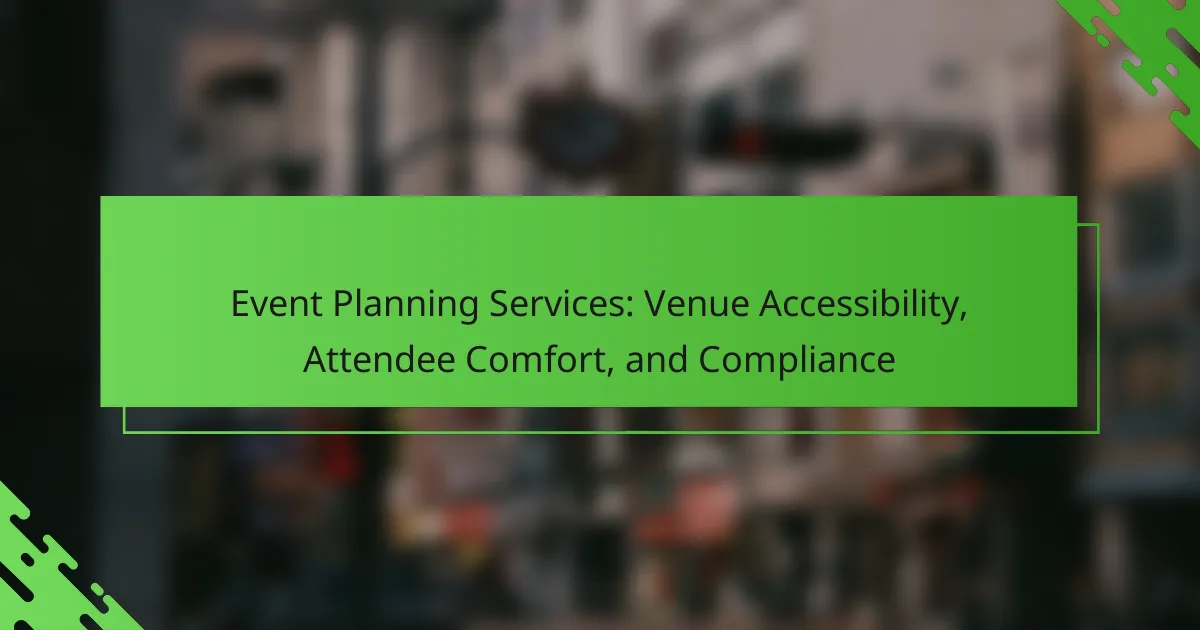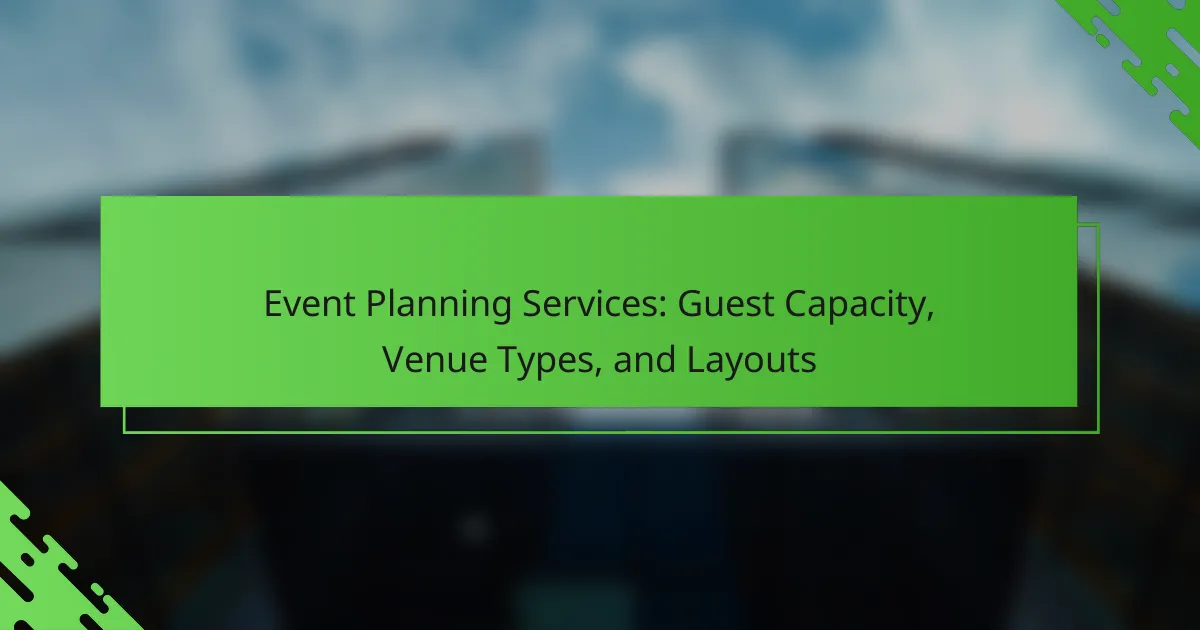Effective event planning services prioritize venue accessibility, ensuring that all attendees, including those with disabilities, can fully participate. By selecting compliant venues and providing necessary accommodations, planners enhance attendee comfort through thoughtful seating arrangements and climate control. Additionally, adherence to compliance regulations is crucial for ensuring safety and legal protection throughout the event.

What are the best event planning services for venue accessibility in Los Angeles?
The best event planning services for venue accessibility in Los Angeles focus on ensuring that venues meet the needs of all attendees, including those with disabilities. This involves selecting venues that comply with accessibility standards, providing necessary accommodations, and facilitating smooth transportation options.
Accessible Venue Options
When selecting accessible venues in Los Angeles, look for spaces that are compliant with the Americans with Disabilities Act (ADA). Key features include wheelchair ramps, accessible restrooms, and designated parking. Popular venues often include convention centers, hotels, and community spaces that prioritize inclusivity.
Consider venues that offer flexible layouts to accommodate various accessibility needs. For example, spaces with movable furniture can create clear pathways for wheelchair users and allow for better navigation. Always verify the accessibility features directly with venue management before making a booking.
Transportation Services
Transportation services play a crucial role in ensuring event accessibility. In Los Angeles, consider partnering with local transportation companies that provide accessible vehicles, such as vans equipped with wheelchair lifts. This ensures that all attendees can reach the venue comfortably.
Additionally, coordinate with public transit options that offer accessible routes. The Los Angeles Metro provides services that comply with accessibility standards, making it easier for attendees to travel to and from the event. Providing clear transportation information in event materials can enhance attendee experience.
Accessibility Audits
Conducting accessibility audits is essential for identifying potential barriers at your chosen venue. These audits assess compliance with ADA standards and highlight areas needing improvement. Engaging a professional auditor can provide a comprehensive evaluation and actionable recommendations.
Regular audits help ensure ongoing compliance and can be a valuable tool for future event planning. Consider scheduling these audits well in advance of your event to allow time for any necessary modifications. This proactive approach not only enhances accessibility but also demonstrates a commitment to inclusivity.

How can event planners enhance attendee comfort?
Event planners can enhance attendee comfort by focusing on seating arrangements, climate control, and refreshment options. These elements significantly impact the overall experience, ensuring that attendees feel relaxed and engaged throughout the event.
Comfortable Seating Arrangements
Comfortable seating is crucial for keeping attendees engaged and satisfied. Consider using ergonomic chairs with adequate support, and ensure there is enough space between seats to allow for easy movement. Aim for a mix of seating styles, such as lounge areas and traditional seating, to cater to different preferences.
When planning seating layouts, think about the event’s format. For example, theater-style seating maximizes capacity but may sacrifice comfort, while round tables encourage interaction but require more space. Always consider the duration of the event; longer events may benefit from more comfortable seating options.
Climate Control Solutions
Effective climate control is essential for maintaining a comfortable environment. Ensure that the venue has adequate heating and cooling systems to accommodate varying weather conditions. It’s advisable to monitor the temperature throughout the event to make adjustments as needed.
Consider providing options for attendees to control their personal comfort, such as fans or portable heaters. Additionally, if the event is outdoors, prepare for temperature fluctuations by offering shaded areas or heating lamps for cooler evenings.
Refreshment Options
Offering a variety of refreshment options can greatly enhance attendee comfort. Provide a selection of beverages, including water, coffee, and soft drinks, to keep guests hydrated and energized. Consider dietary restrictions by including gluten-free, vegetarian, and vegan options in your food offerings.
Timing is also important; schedule breaks for refreshments to prevent fatigue. A well-placed snack station can encourage mingling and networking, enhancing the overall experience. Aim for a balance between healthy options and indulgent treats to cater to diverse preferences.

What compliance regulations must event planners follow?
Event planners must adhere to various compliance regulations to ensure accessibility, safety, and legal protection during events. Key regulations include the Americans with Disabilities Act (ADA), health and safety laws, and specific insurance requirements.
ADA Compliance Standards
ADA compliance standards require that venues are accessible to individuals with disabilities. This includes features such as wheelchair ramps, accessible restrooms, and designated seating areas. Event planners should conduct a thorough accessibility audit of the venue to identify and address any barriers.
To ensure compliance, planners can refer to the ADA guidelines, which provide detailed specifications for physical accessibility. It’s advisable to consult with accessibility experts or organizations to verify that all necessary accommodations are in place.
Health and Safety Regulations
Health and safety regulations are critical for protecting attendees during events. These regulations may include fire codes, crowd control measures, and emergency evacuation plans. Planners should familiarize themselves with local laws and regulations that govern public gatherings.
Implementing a health and safety plan involves assessing potential risks and establishing protocols for emergencies. Regular communication with local health departments can help ensure compliance with any evolving health guidelines, especially in light of recent public health concerns.
Insurance Requirements
Event planners are typically required to obtain liability insurance to protect against potential claims arising from accidents or injuries during the event. The type and amount of insurance needed can vary based on the venue, size of the event, and specific activities planned.
Common types of insurance include general liability, property damage, and event cancellation insurance. Planners should consult with an insurance professional to determine the appropriate coverage and ensure compliance with any venue-specific insurance mandates.

What criteria should be considered when selecting an event venue?
Selecting an event venue involves evaluating several key criteria to ensure it meets the needs of your event and attendees. Important factors include location, accessibility, capacity, layout, and available facilities and amenities.
Location and Accessibility
The venue’s location is crucial for attendee convenience and accessibility. Consider proximity to public transportation, parking availability, and the overall safety of the area. An accessible venue should comply with local regulations, providing features like ramps, elevators, and accessible restrooms.
To enhance accessibility, ensure that the venue is equipped to accommodate individuals with disabilities. This includes clear signage, designated seating areas, and assistance for those who may require it. A well-located venue can significantly boost attendance and satisfaction.
Capacity and Layout
Capacity refers to the maximum number of attendees the venue can comfortably accommodate. It’s essential to choose a venue that aligns with your expected attendance to avoid overcrowding or underutilization. Consider venues that can hold a range of attendees, typically from a few dozen to several hundred, depending on your event type.
The layout of the venue should facilitate smooth movement and interaction among attendees. Look for flexible spaces that can be configured for different activities, such as workshops, networking, or presentations. A well-thought-out layout can enhance engagement and overall experience.
Facilities and Amenities
Facilities and amenities play a significant role in attendee comfort and satisfaction. Evaluate the availability of essential services such as Wi-Fi, audio-visual equipment, catering options, and restrooms. Venues that offer in-house services can simplify logistics and reduce costs.
Additionally, consider amenities like breakout rooms, lounges, and outdoor spaces, which can enhance the event experience. Prioritize venues that provide a range of facilities to meet the diverse needs of your attendees, ensuring a comfortable and productive environment.

How do event planning services ensure inclusivity?
Event planning services ensure inclusivity by focusing on accessibility, comfort, and compliance for all attendees. This involves creating environments that cater to diverse needs and fostering an atmosphere where everyone feels welcome and valued.
Diverse Vendor Partnerships
Building relationships with a variety of vendors is essential for creating inclusive events. Event planners should seek out suppliers who prioritize accessibility, such as venues with wheelchair access, caterers who can accommodate dietary restrictions, and technology providers offering assistive devices.
By partnering with diverse vendors, planners can ensure that all aspects of the event are designed to meet the needs of a broad audience, enhancing the overall experience for everyone involved.
Customized Attendee Experiences
Customized attendee experiences are vital for inclusivity, as they allow planners to tailor elements based on individual needs. This can include offering various seating arrangements, providing materials in multiple formats, or creating sensory-friendly spaces for those who may be overwhelmed by noise or crowds.
Event planners should consider conducting pre-event surveys to gather information about attendees’ preferences and requirements, ensuring that everyone can participate fully and comfortably.
Feedback Mechanisms
Implementing effective feedback mechanisms is crucial for continuous improvement in event inclusivity. Planners should encourage attendees to share their experiences through surveys or open forums, focusing on aspects like accessibility, comfort, and overall satisfaction.
Regularly reviewing this feedback allows event planners to identify areas for enhancement and make informed decisions for future events, ultimately fostering a more inclusive environment for all participants.

What are the emerging trends in event planning for accessibility?
Emerging trends in event planning for accessibility focus on creating inclusive environments that cater to diverse attendee needs. This includes integrating technology, adopting sustainable practices, and embracing virtual and hybrid formats to enhance participation for all individuals.
Technology Integration
Technology plays a crucial role in enhancing accessibility at events. Tools such as mobile apps can provide real-time information about venue layouts, accessibility features, and available services. Additionally, assistive technologies like hearing loops and captioning services ensure that all attendees can engage fully.
When planning, consider using platforms that offer features like virtual tours of the venue, which help attendees familiarize themselves with the space before arrival. This proactive approach can significantly improve comfort and reduce anxiety for individuals with disabilities.
Sustainable Practices
Sustainability in event planning is increasingly linked to accessibility. Venues that prioritize eco-friendly practices often incorporate accessible features, such as ramps and designated seating. Choosing locations that are both sustainable and accessible can enhance the overall experience for attendees.
Organizers should evaluate suppliers and vendors based on their commitment to sustainability and accessibility. For example, opting for biodegradable materials for event materials can reduce environmental impact while ensuring that all attendees can participate without barriers.
Virtual and Hybrid Events
Virtual and hybrid events have become essential for improving accessibility. These formats allow individuals who may face mobility challenges or other barriers to participate from anywhere. They also provide options for attendees to engage in ways that suit their preferences and needs.
When planning a hybrid event, ensure that both in-person and virtual components are equally engaging. This includes offering live streaming, interactive Q&A sessions, and networking opportunities that cater to all participants. Clear communication about how to access these features is vital for maximizing attendance and involvement.



